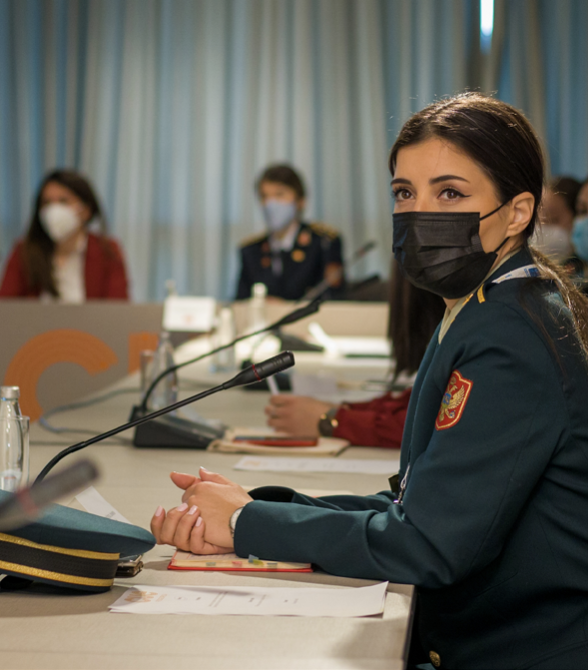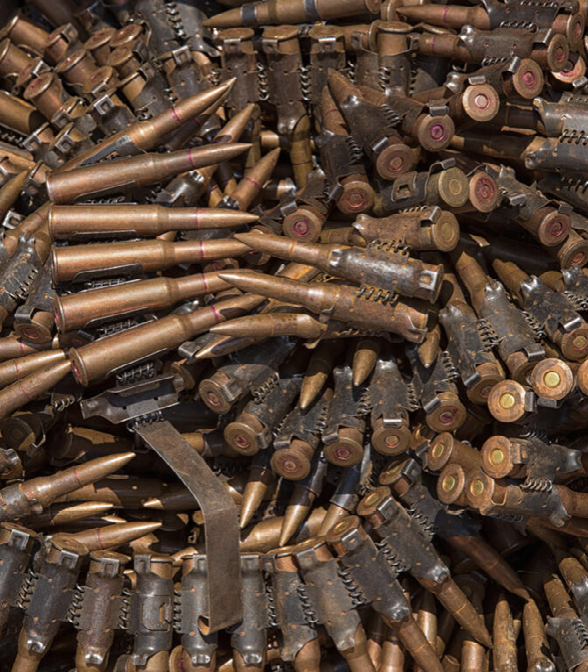Eight ways to support women’s participation in technical arms control
By: Hana Salama

Since its adoption — over twenty years ago — the Women Peace and Security agenda has called for the participation of women in all aspects of peace and security. Despite progress, women’s participation in security fields remains very low, notably in the field of weapons and ammunition management (WAM).
WAM, as it’s known for short, is the oversight and governance of weapons and ammunition in their entire life cycle. It is a key activity in preventing the diversion of weapons and ammunition which fuels conflict and armed violence.
According to the United Nations Institute for Disarmament Research (UNIDIR), women are grossly underrepresented in technical areas of WAM such as marking, tracing, stockpile management, physical security, and disposal. Based on a review of 156 WAM related trainings, a UNIDIR study found that less than 12 % of participants were women.

The continued exclusion of women from international security decision-making and implementation is a problem. Not only is it a right for women to participate in this field, but UNIDIR’s research suggests that a diverse workforce may lead to safer and more effective management of weapons and ammunition, making communities safer. Additionally, in post conflict contexts, improving women’s access to jobs in the security sector has the potential to increase their power as decision-makers,[1] transforming gender relations at a family and community level.
There’s no magic fix for the gender imbalance in the field of technical arms control. Instead, multiple areas of action are needed to redress this situation.
The UNIDIR study “Women Managing Weapons” identifies eight ways to promote women’s participation in weapons and ammunition management technical roles and ensure they have equal opportunities to thrive in this career:
1. Adjust legislation and policies to promote gender equality
WAM technical roles are usually carried out by national security institutions such as the military or the police. In many countries, women are not permitted to join these institutions and even when they are, they have often been restricted to “desk” or “non-combat” roles. This has recently changed in some parts of the world, although legislation and policies related to access to military schools, police training institutions and role requirements need to be adjusted, to ensure that they do not discriminate towards women and foster more diversity. Once women become a part of these institutions, policies such as leave policies, should reflect shared responsibility between women and men of caregiving roles. Security institutions should adapt and facilitate women’s participation by providing adequate infrastructure, uniforms, and ensuring a work environment free from discrimination and sexual harassment.

2. Increase opportunities for training civilians in WAM
In some contexts, WAM roles are carried out by international assistance actors such as United Nations peace operations, and international NGOs. These organisations often train civilians along with national security personnel in technical roles. Increasing training opportunities for civilians by international assistance actors presents a key opportunity for increasing women’s participation in the field of WAM as it offers an important entry point to technical roles for women with no military or police background.
3. Review recruitment processes for WAM roles
Despite their potential to create more opportunities for women in WAM, international assistance actors tend to perpetuate structural inequalities which exist in national institutions. Often, they require WAM technical specialists to have over 10 years of military or security sector experience. Where possible, these organisations should review their recruitment requirements to recognize diverse professional backgrounds, as well as training and experience gained outside of national security institutions and providing more opportunity for on-the-job training.
4. Ask “where are the women?” and follow up with them
When WAM training is offered to national security institutions, it is important to explicitly ask these institutions to nominate women participants. It is also important to follow up with women who have received such training to see if they are still active in the field, and to ensure that they are made aware of future opportunities which can develop their career.

5. Offer gender coaching and training
First pioneered in Sweden, gender coaching helps sensitize senior leaders of security sector institutions on gender issues. Coupled with gender training for both men and women at all levels, this has the potential to transform organizational cultures in the security sector and make these institutions more inclusive.
6. Make women professionals visible
Creating role models in the field of technical arms control by highlighting women technical specialists helps attract more women to this field. Women’s professional associations in security sector institutions can help make women visible and provide peer support throughout their careers. Making women visible is also about counting them in official statistics. It is important that national actors, international organizations and international NGOs, as well as private actors, compile gender-disaggregated data in order to monitor progress towards implementation of regional and international commitments to women’s participation in arms control and disarmament.

7. Engage men as gender champions
Engaging men as gender champions in the security sector is an important part of promoting gender equality and an inclusive and bias-free organizational culture. Women’s participation in arms’ control is not a women’s only issue, but it concerns everyone, especially men, as masculinities have shaped the use and misuse of weapons.
8. Engage donors as agents of change
Donors are key actors to promote equality of opportunity in WAM, as they can incorporate gender-related criteria to drive how funding is used. Donors can also fund initiatives which address the barriers women are facing to enter this traditionally male-dominated field.
Increasing women’s participation in technical arms control is a journey that will take time, focused efforts and resources dedicated to this end. It requires a systematic assessment of the level and nature of women’s participation on a regional and national level, as well as the formulation of policies and practices, informed by these regular assessments. This has the potential to transform organizational cultures in the security sector and make it a truly inclusive work environment.
__________________________________________________________
A researcher in the Gender and Disarmament Programme at the United Nations Institute for Disarmament Research (UNIDIR), Hana Salama, co-author of “Women Managing Weapons: Perspectives for Increasing Women’s Participation in Weapons and Ammunition Management”. She has worked extensively with women’s inclusion and gender equality in disarmament forums and the process of applying gender perspectives in disarmament processes. Prior to joining UNIDIR, Hana was a consultant with the Small Arms Survey where she published several papers on armed violence monitoring in the Sahel and Sub-Saharan Africa and ran a number of disarmament campaigns with international human rights and humanitarian NGOs.
[1] WPS SG report https://www.securitycouncilreport.org/atf/cf/%7B65BFCF9B-6D27-4E9C-8CD3-CF6E4FF96FF9%7D/s_2021_827.pdf
